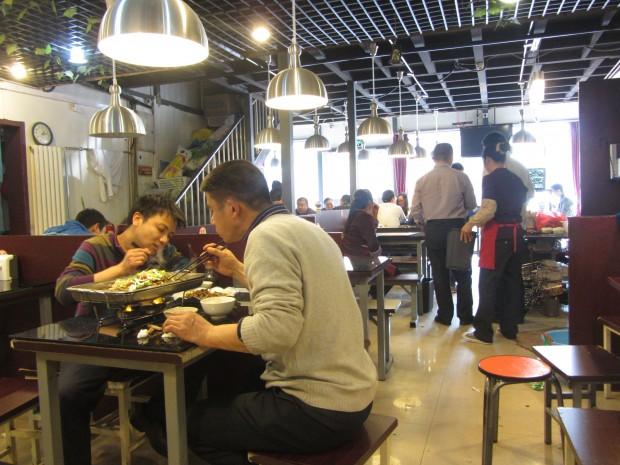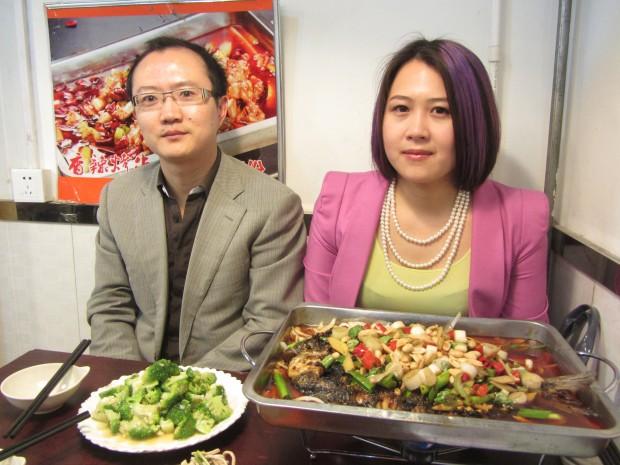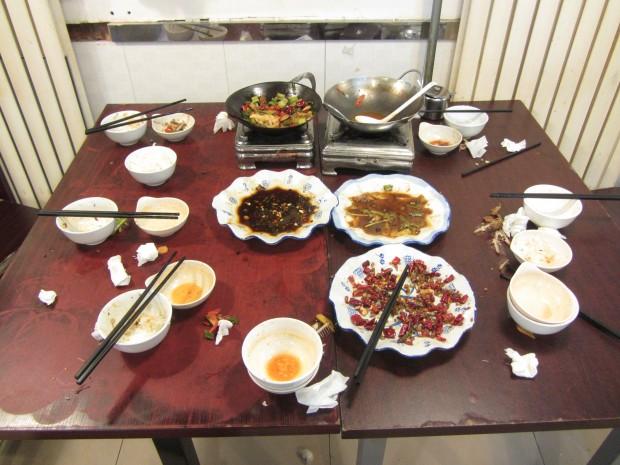No-waste lunch: China’s “Clean Your Plate” campaign
After a lunch with the organizers of China’s “Clean Your Plate” campaign, the plates are almost – but not quite – clean. Agriculture is a big contributor to climate change, and yet globally, roughly 1/3 of food is wasted.
Agriculture is the third-largest emitter of global greenhouse gas pollution. Yet roughly one-third of what we grow is never eaten. Cutting down on waste is a challenge in China, where ordering more than you can eat is seen as a status symbol among the newly wealthy. But a new grassroots “Clean Your Plate” campaign is gaining steam, and starting to change the way people think about leftovers.
There’s a great little neighborhood joint near my home in Beijing. It serves roasted fish in spicy sauces, with a wealth of side dishes.
The place is jammed, but I manage to snare a booth in the back with a couple of young business execs who, with some friends, launched a campaign to save food and help the environment. Zhang Ye explains how they got the idea while taking a mid-career training course together on a college campus.
“We saw the students were wasting a lot of food. And the woman who was collecting students’ leftovers felt that students nowadays didn’t know how to cherish food. And everyone started talking about this phenomenon in their own life.”
Zhang says his parents always told him not to waste food. I say, my parents used to tell me that too – that they’d say, ‘think of all the starving children in Ethiopia.’ He says – his parents weren’t familiar with Ethiopia.
“My parents didn’t know about Ethiopia back then, because China at the time wasn’t very open,” he says. “Anyway, they didn’t need to mention the starving children in Ethiopia. My parents themselves suffered hunger and famine. China in the early ‘60s actually had a more serious famine than Ethiopia’s.”
He’s right. That Chinese famine of 1958-61 killed some 40 million people. Zhang thinks memories of hunger have some effect on why people over-order now.
“China is rich now, people finally have something to spend,” he says. “The other thing is China’s dining culture. If there’s something left in the plates, they have their face. They have a sense of security. If you have more than you actually need, it’s something to be proud of.”

But the new campaign uses the slogan “I’m proud of my clear plate.”
Zhang’s colleague, Xia Xue, a young woman with purple streaks in her black hair, says the group started the campaign in January by taking leaflets and posters to restaurants all over Beijing.
“Our members of this group went to different restaurants and gave them our leaflets and posters and explained to them about our campaign,” she says. “Our members covered almost all the districts in Beijing, and have given out posters to more than a thousand restaurants.”
The campaigners also started posting on Weibo, China’s version of Twitter, which has some 400 million followers. They weren’t the first to do this. Almost a year earlier, journalist Xu Zhijun, had posted a photo of an empty plate on Weibo, with the caption “Operation Empty Plate.” He’d moved to Beijing from a smaller town, and, like Zhang Ye and Xia Xue, was shocked by how much food Beijingers left on restaurant tables.
But Zhang and Xia and their friends had better timing. Their call to action came just after new Communist Party chief Xi Jinping came to power, demanding an end to extravagant banquets and other self-indulgences by Party officials. Last year, government officials spent $48 billion on state banquets. This year, China’s Commerce Ministry says, the sale of luxury food items has been cut in half, and catering companies in Beijing and Shanghai have seen business drop by as much as 35%, as officials have been ordered to not waste food.
“This campaign started by targeting ordinary people,” says Zhang Ye. “But at the same time, Chinese authorities, they begin to counter corruption and correct the behavior of using government money for having meals. This campaign – I would summarize it by saying it started from bottom to top, and then was promoted from top to bottom.”
The “clean your plate” campaign has received millions of mentions on Weibo, and prominent coverage in the official Party newspaper The People’s Daily, and led prime-time evening news on the government’s CCTV-1. Not bad for an idea dreamed up by a few friends around a dining table.
In the months since the campaign was launched, many restaurants in Beijing and beyond have started offering smaller portions, encouraging guests to take doggy bags, and giving out certificates to those who clean their plates.

The owner of the restaurant where we’re eating, Xie Guo Liang, says his customers have started ordering less.
“And my employees have been encouraging people not to order too much, too,” he says.. “Actually, as a businessman, we shouldn’t be doing such a thing. Because you always want people to order more, to buy more.”
But, Xie says, “this is how we were taught. We know that sometimes the things that hurt are actually are good for you.”
Back at our table, we do a reasonable job of getting through our meal, but Zhang Ye’s not entirely satisfied. He nods in the direction of the next table over and says, “I think we should learn from them.”
I look over, and, indeed, the half dozen young office workers at the next table have absolutely polished their plates. I ask if they’ve heard of the “Clean Your Plate” campaign.
“No,” says one young man. “This is just what we do. Why waste food?”
Why indeed – though it may still take time and a little convincing – maybe even arm-twisting – to make this habit fully trickle up to China’s affluent elite.
“What’s for Lunch” is part of “Food for 9 Billion,” a two-year project of Homelands Productions and the Center for Investigative Reporting, with broadcast partners PRI’s The World, PBS NewsHour and American Public Media’s Marketplace.
Our coverage reaches millions each week, but only a small fraction of listeners contribute to sustain our program. We still need 224 more people to donate $100 or $10/monthly to unlock our $67,000 match. Will you help us get there today?
